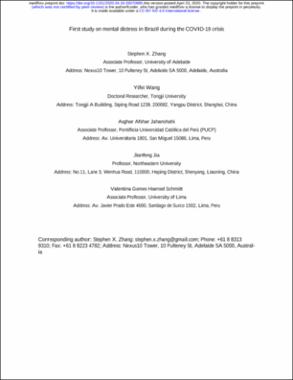First study on mental distress in Brazil during the COVID-19 crisis

Ver/
Descargar
(application/pdf: 346.0Kb)
(application/pdf: 346.0Kb)
Fecha
2020Autor(es)
Metadatos
Mostrar el registro completo del ítemResumen
Objective: We aim to provide the first evidence of mental distress and its associated predictors among adults in the ongoing COVID-19 crisis in Brazil. Methods: We conducted a primary survey of 638 adults in Brazil on March 25-28, 2020, about one month (32 days) after the first COVID-19 case in South America was confirmed in Sao Paulo. Results: In Brazil, 52% (332) of the sampled adults experienced mild or moderate distress, and 18.8% (120) suffered severe distress. Adults who were female, younger, more educated, and exercised less report-ed higher levels of distress. The distance from the Brazilian epicenter of Sao Paulo inter-acted with age and workplace attendance to predict the level of distress. The typhoon eye effect was stronger for people who were older or attended their workplace less. The most vulnerable adults were those who were far from the epicenter and did not go to their workplace in the week before the survey. Conclusion: Identifying the predictors of distress enables mental health services to better target finding and helping the more mentally vulnerable adults during the ongoing COVID-19 crisis.
Cómo citar
Zhang, S. X., Wang, Y., Afshar Jahanshahi, A., Jia, J. & Gomes Haensel Schmitt, V. (2020). First study on mental distress in Brazil during the COVID-19 crisis [Preprint]. https://doi.org/10.1101/2020.04.18.20070896Editor
MedrxivNota
This article is a preprint and has not been peer-reviewed. It reports new medical research that has yet to be evaluated and so should not be used to guide clinical practice.
Coleccion(es)
- Administración [12]
El ítem tiene asociados los siguientes ficheros de licencia:

